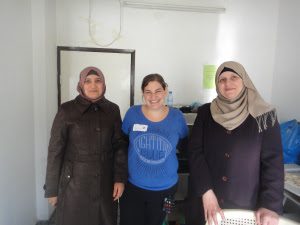
My friend Kitti South Robinson along with Melissa Diamond are in Jenin, in the West Bank of the Palestinian territory for the next few months working on “The Jenin Autism Project,” part of “A Global Voice for Autism.” They are there to help parents learn about autism and Applied Behavior Analysis and help connect them to other autism resources as well as building their own supportive network. They are blogging their experiences here to share their efforts in figuring out how to best help children with autism in a part of the world where so little help is available. See the end of this post for links to prior posts on “The Jenin Autism Project.”
By Melissa Diamond
Meet Our Families
Aseel* and Fatima* and their sons Mohammad* and Basil* are two of the families who are participating in our program. They are excited to learn strategies to work with their children and want to raise awareness about autism in their community. Over the next two-and-a-half months we will be following Aseel and Fatima’s experiences in the program. We will be featuring their stories in weekly blog posts in order to give you an idea of the autism family’s experiences in A Global Voice for Autism’s Jenin Autism Project.
Aseel* and her son Mohammad learned about our parent training program over the summer. Since then, they have anxiously been awaiting the team’s arrival. Although Mohammad’s father has taken him to Jordan for medical appointments in the past, the family is looking for a consistent program that is close to home where their son can work on his skills.
Mohammad is 5 years old and is generally a happy child. His parents say that he has a talent for technology, and he enjoys entertaining himself with games on his iPad. When Mohammad is not using his iPad, he loves playing with toys that light up. He enjoyed the flashlights and light-up balls at our session today. Aseel says that at home Mohammad has the skills to dress himself and to request certain foods. However, Mohammad still uses few words to communicate.
Melissa: What did you learn in the training today and what were your favorite parts?
Aseel: Today we learned how to work with our children to help them learn. I learned to use what he already likes in order to get him to request things from me. I will use this to encourage him to request foods that I already know he likes when he wants to eat them.
What behaviors are you hoping to address/improve through participation in this program?
Aseel: Mohammad screams when he wants toys, and I want to teach him how to ask for what he wants in a way that is less disruptive. He really doesn’t like haircuts.
What else would you like us/the community to know?
Aseel: I am thankful for the skills that my son already has, and I am hopeful that he can learn many new skills in this program. I would like to come to the program on additional days during the week in order to practice ABA skills and to continue to learn.
Basil is five years old and is an easygoing child. When one toy is taken from him, he quickly moves on to another. But when given the option, he loves drawing and playing with toy animals, especially chickens. He has a favorite toy chicken at home, but his mother took it away from him because she says that he becomes too focused on it when he has it. Although he does not have a formal autism diagnosis, Fatima recognizes that her son displays many behaviors that are characteristic of autism and believes that ABA skills will be helpful to her in the home.

Melissa: What did you learn in the training today and what were your favorite parts?
Fatima: Today I learned how to take toys and have [Basil] request them from me. We are starting with simple things so that we can see progress and improvement.
What behaviors are you hoping to address/improve through participation in this program?
Fatima: I want to understand Basil and to have him understand me. Ideally, I want him to learn to speak. I will be happy with any progress and improvement, even simple things. I hope to get results from treatment and to learn how to work with Basil in my home so that he can continue to make progress.
What else would you like us/the community to know?
Fatima: (Like Aseel) I would like to participate in more hours of training so that I can learn more skills. I hope to keep up with the program in the future and to stay in touch with the therapist team over Skype for feedback. I hope that you will come back.
A Recap of Today:
Today, we had our first ABA skills training and hands-on training for the mothers with their children with autism. The mothers spent the first hour of the program in the classroom learning about behavioral momentum and positive reinforcement. While Kitti led this training, Katrina, Daniel and I, along with two of our translators, played and paired with the children.
Some of the parents came prepared with their child’s favorite toys for the reinforcement training, but all of the children quickly found items in our play room to entertain themselves.
When the mothers came downstairs after their training, we divided them into three groups and gave them feedback as they practiced reinforcing requesting behavior and one-step instructions with their children. For non-verbal children (many of the children in our program), requesting an item includes staring at an item, pointing to an item or attempting to grab the item.
The mothers caught on quickly and were excited to implement ABA with their children. In my group, some of the mothers had difficulty finding items that were more exciting to the child than whatever they were already playing with, but they all thought of items in their homes that they could use to practice reinforcing requests over the next week.
At the end of today’s training, two mothers pulled me aside and asked whether we could increase the number of training days every week so that they can continue to learn and improve their skills. We are going to try to add more optional practice days where they can come to the center for ABA.
*Names in this post have been changed in order to protect the privacy of the individuals pictured. All program participants pictured on our blog have provided written consent to have their image used for this purpose and may request the removal of their image for any reason at any time.
Melissa and Kitti will take turns blogging about their experiences, which will be posted here and on their own blog. For more information, please check their blog and the website for A Global Voice for Autism.












